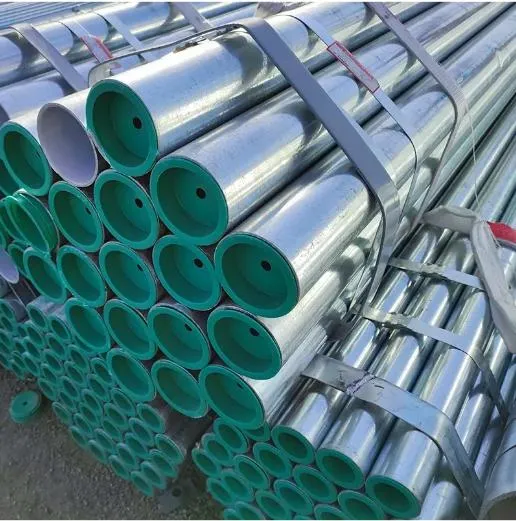-
Cangzhou Yulong Steel Co., Ltd.
-
Phone:
+86 13303177267 -
Email:
admin@ylsteelfittings.com

Nov . 06, 2024 08:38 Back to list
Understanding Corrosion in Galvanized Pipes and Effective Prevention Strategies
Understanding the Rusting of Galvanized Pipe Causes, Effects, and Prevention
Galvanized pipes have long been favored in various plumbing and construction applications due to their resistance to corrosion and their ability to withstand moisture. These pipes are coated with a layer of zinc, which serves as a protective barrier against rust. However, despite their advantages, galvanized pipes are not entirely immune to rusting. Understanding the factors contributing to this phenomenon is crucial for maintaining the integrity of plumbing systems and ensuring their longevity.
What is Galvanization?
Galvanization is a process that involves coating iron or steel with zinc to prevent corrosion. The zinc serves a dual purpose it acts as a protective barrier against moisture and oxygen, and it also provides cathodic protection for the underlying metal. If the coating is scratched or damaged, the zinc will corrode preferentially, protecting the steel beneath from rusting for a period of time. This is why galvanized pipes are often seen as a durable solution for plumbing needs.
Causes of Rusting in Galvanized Pipes
Despite the protective layer, galvanized pipes can still rust under certain conditions. Here are several factors that contribute to the rusting of galvanized pipes
1. Moisture and Water Quality Prolonged exposure to moisture is one of the primary causes of rusting. If the water running through the pipes is highly acidic or contains high levels of chlorides, it can accelerate the corrosion process. Similarly, stagnant water—which can occur in poorly designed plumbing systems—can lead to increased vulnerability to rust.
2. Physical Damage Any physical damage to the outer zinc layer—such as scratches, dents, or punctures—compromises the integrity of the pipe. Once the protective zinc layer is broken, the underlying steel is exposed to the elements, leading to rust formation.
3. Environmental Conditions Galvanized pipes exposed to harsh environmental conditions, such as high humidity, saltwater, or industrial pollutants, are at an increased risk of corrosion. Areas with high moisture content are particularly problematic, as they create an ideal environment for rust to develop.
4. Age and Wear Over time, the protective zinc coating can wear down due to erosion or chemical reactions, making older galvanized pipes more susceptible to rust. Moreover, if the pipes are improperly installed or not maintained, their lifespan can significantly decrease, leading to rust formation.
galvanized pipe rusting

Effects of Rusting
The rusting of galvanized pipes can have serious implications for plumbing systems. As rust develops, it can lead to blockages and reduced water pressure, potentially resulting in costly repairs. Furthermore, the rust can compromise the quality and safety of the water supply, as it may cause discoloration and release harmful substances into the water. In extreme cases, rust can cause structural failures in the pipes, leading to leaks and water damage in surrounding areas.
Preventing Rusting in Galvanized Pipes
To extend the lifespan of galvanized pipes and prevent rusting, several preventive measures can be employed
1. Regular Inspection and Maintenance Conducting routine checks for signs of damage or wear can help catch problems early. Addressing minor scratches and cracks can prevent moisture from reaching the underlying steel.
2. Water Quality Management Monitoring and treating the water quality can minimize corrosion risks. Installing water softeners and filtration systems can help remove harmful substances from the water supply.
3. Proper Installation Ensuring that the pipes are installed correctly plays a vital role in preventing rust. Avoiding areas with high humidity and ensuring proper drainage can mitigate rust formation.
4. Replacement In cases where galvanized pipes are extensively rusted or nearing the end of their lifespan, it may be more cost-effective to replace them with more modern materials, such as PVC or PEX, which offer greater resistance to corrosion.
In conclusion, while galvanized pipes offer many benefits, they are not immune to rusting. By understanding the causes and taking appropriate preventative measures, homeowners and builders can protect their plumbing systems, ensuring reliable and safe water delivery for years to come.
Latest news
-
ANSI 150P SS304 SO FLANGE
NewsFeb.14,2025
-
ASTM A333GR6 STEEL PIPE
NewsJan.20,2025
-
ANSI B16.5 WELDING NECK FLANGE
NewsJan.15,2026
-
ANSI B16.5 SLIP-ON FLANGE
NewsApr.19,2024
-
DIN86044 PLATE FLANGE
NewsApr.19,2024
-
DIN2527 BLIND FLANGE
NewsApr.12,2024
-
JIS B2311 Butt-Welding Fittings LR/SR 45°/90° /180°Seamless/Weld
NewsApr.23,2024
-
DIN2605-2617 Butt-Welding Fittings LR/SR 45°/90°/180° Seamless/Weld
NewsApr.23,2024











